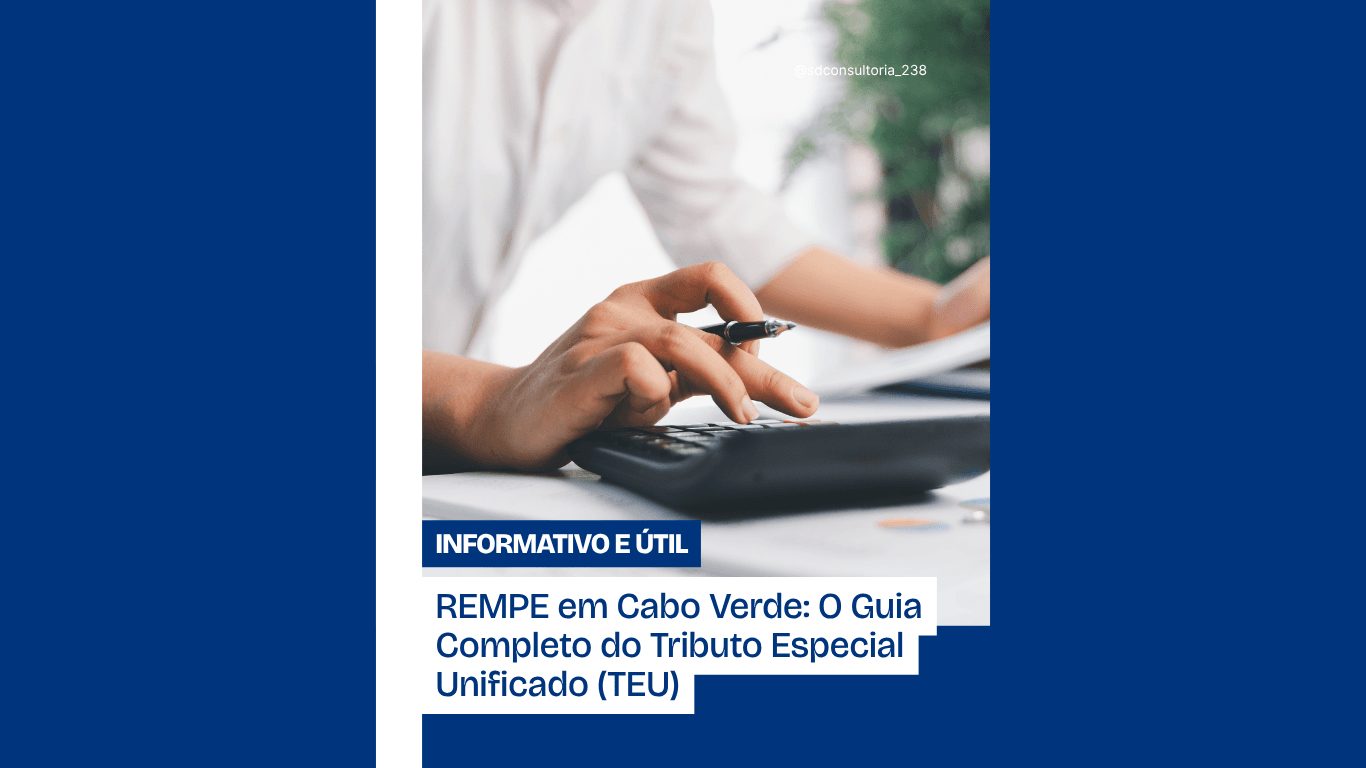

The 5S methodology, which originated in Japan, is widely recognised as an essential tool for continuous improvement in organisations, promoting efficiency, organisation and discipline in the workplace. This method, which is based on five fundamental principles - Seiri (Use), Seiton (Organisation), Seiso (Cleanliness), Seiketsu (Standardisation) and Shitsuke (Discipline) - has demonstrated significant results in various business contexts around the world.
Implementing 5S in Cape Verdean companies can represent a unique opportunity to optimise processes, reduce waste and improve the quality of the products and services offered. Studies indicate that the effective application of 5S not only improves productivity, but also boosts employee morale and creates a safer and more organised working environment. For example, a study published in International Journal of Research in Industrial Engineering highlighted a significant increase in employee productivity and motivation after adopting 5S.
In the Cape Verdean context, where organisational culture can present specific challenges, implementing 5S requires careful planning and the involvement of the whole team. It is crucial to adapt 5S practices to local cultural and economic particularities in order to guarantee their effectiveness and long-term sustainability. The experience of companies that have already adopted this methodology shows that, with the right commitment, it is possible to transform the working environment and achieve extraordinary results.
This report aims to explore the best practices for implementing 5S in Cape Verde, offering a detailed guide for managers and business leaders who wish to integrate this philosophy of continuous improvement into their daily operations. Throughout this document, the essential steps for applying 5S, the common challenges faced and strategies for overcoming them will be discussed, with practical examples of success in similar contexts.
Contents
The 5S methodology, which originated in Japan, is a continuous improvement tool that aims to optimise the organisation and efficiency of work environments. In Cape Verde, the application of 5S can be especially advantageous due to the country's cultural and economic characteristics, where the efficient management of resources is crucial. Implementing 5S in Cape Verdean companies can help overcome common challenges such as limited resources and the need to increase competitiveness in the global market.
One of the main benefits of 5S is increased productivity. Studies indicate that organising the workspace allows employees to concentrate better on their tasks, reducing the time spent on non-productive activities. In Cape Verde, where companies often face resource constraints, improving productivity can translate into significant gains in efficiency and competitiveness.
The 5S methodology emphasises the elimination of waste, which is particularly relevant in contexts where resources are scarce. Through the sense of use (Seiri), Cape Verdean companies can identify and remove unnecessary items, optimising the use of space and resources (Customised). This practice not only reduces operating costs, but also improves the sustainability of operations.
The application of 5S helps to create a safer working environment. A sense of cleanliness (Seiso) and standardisation (Seiketsu) help prevent accidents by ensuring that work spaces are always clean and organised (eBox Digital). In Cape Verde, where safety at work is a growing concern, implementing 5S can help reduce incidents and improve employee well-being.
The implementation of 5S in Cape Verde must take into account the country's cultural particularities. Cape Verdean culture values collectivity and collaboration, which can be an advantage when implementing 5S, which requires the involvement of all employees (HighSkills). However, it is essential to adapt communication and training methods to ensure that everyone understands and commits to the 5S principles.
To ensure the success of 5S, it is essential to invest in employee training and capacity building. Training programmes should be developed to educate employees about the benefits and practices of 5S, promoting a mindset of continuous improvement (G4 Education). In Cape Verde, where access to training resources can be limited, it is important to use innovative approaches, such as distance learning, to reach a wider audience.
Integrating 5S with the PDCA (Plan-Do-Check-Act) cycle can maximise the results of continuous improvement in Cape Verdean companies. The PDCA cycle provides a systematic framework for implementing, monitoring and adjusting 5S practices, ensuring their long-term sustainability (Continuous Improvement). This integrated approach can help companies respond quickly to changes in the business environment and maintain a constant focus on improvement.
The implementation of 5S can also be aligned with sustainability and social responsibility initiatives. By reducing waste and optimising the use of resources, Cape Verdean companies can contribute to environmental preservation and the country's sustainable development (Econsult). In addition, 5S practices can improve corporate image and strengthen relationships with the local community.
Studies carried out on Cape Verdean farms show that the application of 5S can lead to significant improvements in agricultural management and productivity (Academia.edu). These success stories can serve as models for other industries in the country, illustrating how 5S can be adapted and implemented in different business contexts.
Some companies in Cape Verde have already started adopting 5S and have reported improvements in efficiency, quality and safety. These pioneering companies can act as thought leaders, sharing their experiences and best practices with other organisations in the country (ProLeanVision). The exchange of knowledge and collaboration between companies can accelerate the adoption of 5S in Cape Verde and maximise its benefits.
The 5S methodology offers a robust set of tools for improving efficiency, productivity and safety in Cape Verdean companies. By adapting the implementation of 5S to Cape Verde's cultural and economic specificities, companies can not only improve their competitiveness, but also contribute to the country's sustainable development. Ongoing training, integration with other continuous improvement methodologies and the sharing of successful experiences are essential to maximising the benefits of 5S in Cape Verde.
The successful implementation of 5S in Cape Verdean companies requires detailed strategic planning and an initial assessment of existing processes. This step is crucial for identifying areas in need of improvement and for defining clear and measurable objectives. Planning should include identifying the resources needed, such as time, personnel and budget, as well as defining a timetable for implementation. In addition, it is important to carry out a SWOT (Strengths, Weaknesses, Opportunities, Threats) analysis to understand the internal strengths and weaknesses, as well as the external opportunities and threats that could impact the implementation of 5S (S&D Consultancy Cape Verde).
Although training and capacity building have already been covered in previous reports, it is important to highlight the need for an ongoing programme of education and development to ensure the sustainability of 5S. Training must be adapted to Cape Verde's cultural specificities, using innovative methods such as e-learning and interactive workshops to involve all employees. This continuous focus on education helps to create an organisational culture that values continuous improvement and operational efficiency (G4 Education).
Effective communication is an essential component of 5S success. Companies must establish clear and open communication channels to ensure that all employees understand the aims and benefits of 5S. This includes regular meetings, newsletters and visual communication boards in the workplace. Active employee involvement is key, as 5S depends on everyone's commitment and participation to be effective. Incentives and recognition can be used to motivate employees to adhere to 5S principles and contribute to its successful implementation (TOTVS).
Continuous monitoring and evaluation are essential to ensure that the implementation of 5S achieves its objectives. Companies should establish monitoring mechanisms, such as regular audits and checklists, to evaluate progress and identify areas for improvement. Employee feedback should be collected regularly to adjust and refine processes as necessary. This approach allows Cape Verdean companies to maintain a cycle of continuous improvement, adapting quickly to changes in the business environment.
Although integration with sustainability practices has been mentioned previously, this report highlights the importance of aligning 5S with corporate social responsibility initiatives in Cape Verde. By reducing waste and optimising the use of resources, companies can not only improve their efficiency, but also contribute to the country's environmental preservation and sustainable development. In addition, adopting sustainable practices can improve corporate image and attract customers and investors who value social and environmental responsibility.
The ability to adapt and be flexible is crucial to the successful implementation of 5S in Cape Verde. Companies must be prepared to adjust their processes and practices as they face new challenges and opportunities. This includes adapting to changes in the market, incorporating new technologies and responding to feedback from employees and customers. Organisational flexibility allows companies to maintain their competitiveness and continue to thrive in a constantly evolving business environment.
Collaboration between companies and knowledge sharing are effective strategies for accelerating the adoption of 5S in Cape Verde. Pioneering companies that have already successfully implemented 5S can act as thought leaders, sharing their experiences and best practices with other organisations. This exchange of knowledge can help overcome common challenges and maximise the benefits of 5S throughout the country. In addition, collaboration with educational institutions and consultancy organisations can provide additional support and resources for 5S implementation.
Technology and automation can play a crucial role in implementing 5S, especially in sectors where operational efficiency is a priority. Cape Verdean companies should consider adopting digital tools to monitor and manage their 5S processes, such as quality management software and internal communication platforms. Automating repetitive tasks can free up time and resources to focus on higher value-added activities, contributing to continuous improvement and innovation (Quiker).
Finally, companies should assess the social and environmental impact of implementing 5S to ensure that their practices are aligned with sustainability and social responsibility objectives. This includes analysing key performance indicators such as waste reduction, energy efficiency and employee satisfaction. Assessing social and environmental impact can help companies identify areas for improvement and demonstrate their commitment to sustainable development to stakeholders and investors (United Nations).
The implementation of 5S in Cape Verde faces significant challenges related to leadership involvement and organisational culture. Leadership plays a crucial role in promoting and sustaining the changes necessary for the success of 5S. In many Cape Verdean organisations, resistance to change can be an obstacle, especially if the leadership is not fully committed to the process. To overcome this challenge, it is essential that leaders not only support implementation, but also actively participate, demonstrating their commitment to continuous improvement. Leadership should be seen as role models, participating in activities such as organisation and cleaning, reinforcing the importance of 5S. In addition, clear and effective communication about the benefits of 5S is vital to ensure the involvement of all employees (Studocu).
Effective communication is another critical challenge in implementing 5S in Cape Verde. A lack of clear communication can lead to misunderstandings and resistance among employees. To mitigate this problem, companies should establish open communication channels and use visual tools to explain the benefits of 5S. Regular meetings and bulletin boards with results achieved can help keep everyone informed of the programme's progress and importance. In addition, proper training is key to ensuring that all employees fully understand the principles of 5S and how to apply them in their daily work. Practical workshops and real examples from everyday life can be effective for this purpose.
Cultural adaptation is an essential aspect of implementing 5S in Cape Verde. Cape Verdean culture values collectivity and collaboration, which can be an advantage when implementing 5S, which requires the involvement of all employees. However, it is crucial to adapt communication and training methods to ensure that everyone understands and commits to the 5S principles. The use of innovative approaches, such as distance training, can be beneficial in reaching a wider audience, especially in remote areas where access to training resources may be limited (HighSkills).
Implementing 5S in Cape Verde can be aligned with sustainability and social responsibility initiatives. By reducing waste and optimising the use of resources, Cape Verdean companies can contribute to environmental preservation and the country's sustainable development. In addition, 5S practices can improve corporate image and strengthen relationships with the local community. Integrating 5S with sustainability practices can help companies achieve a balance between operational efficiency and social responsibility.
Continuous monitoring and evaluation are fundamental to the success of 5S in Cape Verde. The implementation of 5S should not be seen as a one-off event, but as a continuous process of improvement. Companies should establish clear performance indicators and carry out regular audits to assess progress and identify areas for improvement. The use of audit checklists can be an effective tool to ensure that 5S standards are maintained over time. In addition, continuous monitoring allows companies to adjust their strategies as necessary to meet new challenges and opportunities (Frons).
Integrating 5S with other continuous improvement methodologies, such as the PDCA (Plan-Do-Check-Act) cycle, can maximise the benefits of the programme. The PDCA cycle offers a systematic framework for planning, implementing, checking and acting on improvements, complementing the principles of 5S. This integration can help companies create an organisational culture that values continuous improvement and operational efficiency. In addition, collaboration with educational institutions and consultancy organisations can provide additional support and resources for the implementation of 5S.
The use of technology and automation can be an important facilitator in the implementation of 5S in Cape Verde. Technological tools can help monitor progress, manage data and facilitate communication between employees. Process automation can increase efficiency and reduce the manual workload, allowing employees to focus on higher value-added activities. However, it is important to ensure that the introduction of new technologies is accompanied by adequate training to ensure that all employees are comfortable and able to use them effectively.
Assessing the social and environmental impact of implementing 5S is crucial to ensuring that the programme not only improves operational efficiency, but also makes a positive contribution to the community and the environment. Companies must consider the impact of their operations on local communities and the environment and look for ways to minimise any negative effects. Regularly assessing social and environmental impact can help companies identify opportunities to improve their practices and strengthen their commitment to social and environmental responsibility (GovCV).
Collaboration between companies and knowledge sharing are effective strategies for accelerating the adoption of 5S in Cape Verde. Pioneering companies that have already successfully implemented 5S can act as thought leaders, sharing their experiences and best practices with other organisations. This exchange of knowledge can help overcome common challenges and maximise the benefits of 5S throughout the country. In addition, collaboration with educational institutions and consultancy organisations can provide additional support and resources for 5S implementation.
The ability to adapt and be flexible is crucial to the successful implementation of 5S in Cape Verde. Companies must be prepared to adjust their processes and practices as they face new challenges and opportunities. This includes adapting to changes in the market, incorporating new technologies and responding to feedback from employees and customers. Organisational flexibility allows companies to maintain their competitiveness and continue to thrive in a constantly evolving business environment (World Bank).
Research into the application of the 5S methodology in Cape Verdean companies shows that this continuous improvement practice can bring significant benefits, including increased productivity, reduced waste and improved safety at work. Adapting 5S to the cultural specificities of Cape Verde, which values collectivity and collaboration, is crucial to its success. Ongoing training and employee empowerment are essential to ensure that everyone understands and commits to the principles of 5S, promoting an organisational culture of continuous improvement and operational efficiency (HighSkills).
Integrating 5S with other methodologies, such as the PDCA cycle, can maximise its benefits, offering a systematic framework for the implementation and continuous monitoring of improvement practices. In addition, collaboration between companies and knowledge sharing are effective strategies for accelerating the adoption of 5S in Cape Verde, with pioneering companies acting as thought leaders and sharing their experiences and best practices. The use of technology and automation can facilitate the implementation of 5S, while social and environmental impact assessment ensures that business practices are aligned with sustainability and social responsibility objectives.
To maximise the benefits of 5S, Cape Verdean companies must adopt a flexible and adaptive approach, adjusting their processes and practices as necessary to meet new challenges and opportunities. Effective communication and active employee involvement are key to the success of 5S, ensuring that everyone in the organisation is aligned with the programme's objectives. By aligning 5S with sustainability and social responsibility practices, companies can not only improve their efficiency, but also contribute to the sustainable development of Cape Verde, strengthening their corporate image and relationship with the local community (Econsult).







